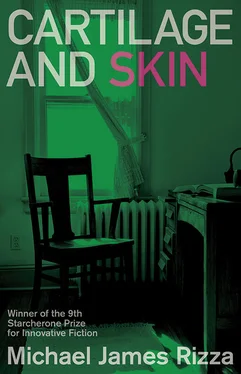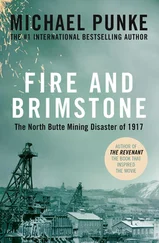Even though this scum was the least incriminating trace of my case study, I became scared the instant I saw the residue: I had left myself vulnerable and exposed all night long. I went mad with panic. My heart leapt to life in my chest, as if it were a wild rodent suddenly tossed into a sack. However, while I was frantically scrubbing the sink, something peculiar happened to me. I seemed to step outside of myself for a moment and watch this tall, lanky man with pale arms, in his white tee-shirt and underwear, leaning into his sink. From this perspective, he looked absurd. What had made him so confused? What exactly had violated him to the breaking point? What had driven him to treat his own humanity as just a tangle of flayed skin that he used to cloak himself whenever he encountered another person? I began to see myself more clearly. The dark cloud of dread lifted a bit as a strange, new calm descended upon me. I understood that the most unsettling violation of my freedom was my fear that the authorities would never stop investigating and invading the life of their suspect, Parker the pervert. Yet where was my hiding place and from whom was I hiding? The spastic thing inside my chest began to settle down. I began to breathe again. Where are your accusers now? Who condemns you? I sensed that on this morning I had experienced my last bout with anxiety that I would have in my life. The demons had fled; the ugly swine had drowned themselves. Since puberty, I’d suffered random and unexplainable panic attacks. Then all at once, at my kitchen sink, something deep in my brain realigned, and I knew that the attacks were gone.
Nevertheless, I waited for the fiendish swine to return. I was dimly aware that my anticipation itself could have reopened the door and ushered the demons back in: Anticipation could have given way to brooding, and then brooding to repossession. Yet I was saved by another force, sort of distracted by a desire to revel in myself, to open up and unleash myself, but I couldn’t decide what I wanted to do or how to go about doing it. Apparently, there were more demons inside of me than a phantom father and a hyper-refined sense of chastity.
After all, a person who lives in his mind has trouble living in his body. It becomes an absurdity to him because he doesn’t know what to do with it. There is even the chance that it can become grotesque. He knows that it is located in the world, that it moves in time and space, and that it is, at least, a receptacle for his mind, to say nothing of his soul. The body is at the mercy of innumerable necessities, from water and food to atmospheric pressure and the exact degree of tilt to the earth’s axis. The irony is that while the body is the most empirically known part of man — because it bruises easily, tastes fruit, and has orgasms — it is the lesser part. Given a universe of necessities, the body remains helplessly outside of a person’s actual control. Perhaps it is for this reason that the collective unconscious of the human race has invented the soul — that part of us that slips beyond the reach of the world. We have no idea what a soul is or how it is contained in a body. This ignorance is essential because the moment we locate the soul is the moment we lose it, as well as our humanity. Like Diogenes the Cynic, we can take our business outside and crap in the street. All the old verities and truths of the heart won’t even be around for “when the last dingdong of doom has clanged and faded from the last worthless rock hanging tideless in the last red and dying evening,” because man will neither endure nor prevail; his insides — that which makes him man — have been sucked out and thrown away. Of course, if we are going to have a soul, why not say that it is made up of stuff that is impervious to the world, and while we are at it, why not add that its true home is beyond the world? In the meantime, we can abhor our bodies like good Neo-Platonists or squat like heavy rocks in a Giotto painting, as we wait to get to our eternal home, back to the real and true ground of our being. Or like good Americans, we can apprehend our souls just enough to give us a sense of hope and a cozy feeling in our hearts. Unfortunately, in this sense, those of us without a soul are homeless. At best, our body becomes a piece of equipment, and whatever we do with it has no consequence on any soul. After a while, we may wonder why do anything with the body at all, as all the delights of sensation begin to lose their thrill — why should a magician keep repeating the same old trick once it’s been figured out? And it is a trick, isn’t it, a gross trick played on us by nature, that we should be so dependent upon and mingled with such a helpless and futile thing as flesh? Once a person begins to retreat into his mind, he might find that it is a mansion with many rooms, and like any good homeowner, he will want to warm them all and turn on all the lights, one by one, until his mind has far outgrown the confines of his gelatinous brain and bony skull.
But there is something else he might find. Worse than the possibility that the content of his thoughts has no partner in reality, he might find that his mind is all potentiality, like a pantheistic deity. The normal mind is only aware of its trinity of subject, agent, and object, such as when a man says I know myself . This is obviously a little different from saying I walk the dog because in the former the self is divided into three parts: the subject I who has the power or agency to know the object myself . Of course, Saint Augustine used this minor trinity as an analogy of a Triune God, and the saint’s presumption — once again, of course — was divine arrogance in microcosm. Following him, this spirit of confidence began to fester in the western world, and it spread into every appendage, until even the dirty, toothless peasant boys were professing that man was the center of the universe. It was a pandemic disease. The Cartesians, persisting under the same delusion, convinced themselves that I think was a sturdy foundation for certainty. We remained solid and certain for centuries, so we powdered our white wigs and swallowed the keys to the locked boxes of our maidens’ crotches. That was all splendid until our arrogance slowly began to crumble, and the body — which had been suppressed by our arrogance — began to figure as the main factor in our thinking. But we weren’t quite sure what to do with it. Diogenes re-lit his lantern. Philosophers started carrying hammers into the marketplace. The psychologists then came along with their scalpels and cut up the subject I into little bits, and they replaced the soul with a void. The first premise I —let alone the know and the myself —was all mutilated.
Now, we have the soulless man living in a fractured mind.
We can’t ask the soulless man who he is, nor categorize him by characteristics and qualities. Once possibility becomes as real as actuality, man is nothing definite but everything potentially. In man, the order of being has been reserved. At one time, Aristotle would’ve had us think that prime matter was at the lowest echelon, as some type of gob without form, just waiting to be shaped — while at the highest echelon was the wholly actualized and definite, pondering its own perfection. But now, in man, the definite has become the limited, boxed in, and stifled, though still pondering itself under the delusion that it is a whole. Yet the soulless man is as polymorphic as prime matter; he is always becoming but never being, and though he is becoming, he becomes toward no end—
Or better yet, just forgive me now. Just ignore me. My god, my god, my god. Like any normal man, or even like a twelve-year-old boy, I should be able to speak clearly, without all this rambling. Yes, I confess, I was horny. After my anxiety had left me, I languished alone in my apartment, feeling the tug of desire. All my babbling has come to this little head: I was desperately and wickedly horny. But for my body, my body, my body. Hungry and obsessed with food, I starved myself, and all my rationalizations and reveries fail to explain such desiccation.
Читать дальше












